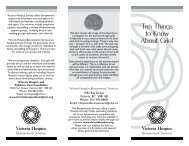Dealing with Grief. A Guide to Understanding Your - Victoria Hospice
Dealing with Grief. A Guide to Understanding Your - Victoria Hospice
Dealing with Grief. A Guide to Understanding Your - Victoria Hospice
You also want an ePaper? Increase the reach of your titles
YUMPU automatically turns print PDFs into web optimized ePapers that Google loves.
When someone important <strong>to</strong> you dies, you<br />
grieve. This means that you may experience<br />
a wide range of responses, often over an<br />
extended period of time. The following<br />
three sections generally coincide <strong>with</strong> early,<br />
middle and later grief, though variation and<br />
overlap of these phases is common.<br />
When a death occurs<br />
When a death occurs<br />
Walking the Edges<br />
Social<br />
Withdrawal from others<br />
Unrealistic expectations of self and others<br />
Poor judgement about relationships<br />
The <strong>Grief</strong> Journey<br />
Adjusting <strong>to</strong> loss<br />
Entering the Depths<br />
Social<br />
Rushing in<strong>to</strong> new relationships<br />
Wanting company but unable <strong>to</strong> ask<br />
Continued <strong>with</strong>drawal and isolation<br />
Self-consciousness<br />
As life goes on<br />
Social<br />
Mending the Heart<br />
More interest in daily affairs of self/others<br />
Ability <strong>to</strong> reach out and meet others<br />
Energy for social visits and events<br />
As you accept the fact of the death of<br />
someone important, you will feel shock,<br />
numbness and disbelief that this has<br />
happened. Panic and strong physical and<br />
emotional reactions are common.<br />
Physical<br />
Shortness of breath and palpitations<br />
Digestive upsets<br />
Low energy, weakness and restlessness<br />
Physical<br />
Changes in appetite and sleep patterns<br />
Shortness of breath and palpitations<br />
Digestive upsets<br />
Physical<br />
Physical symp<strong>to</strong>ms subside<br />
Sleep pattern and appetites are more settled<br />
Gut-wrenching emptiness lightens<br />
Adjusting <strong>to</strong> loss<br />
Later, as the numbness subsides, you will deal<br />
<strong>with</strong> what this loss means <strong>to</strong> you and the<br />
emotional pain of grieving. The intensity of<br />
feeling may surprise or frighten you, but it is<br />
natural and can be resolved as you move<br />
through it.<br />
As life goes on<br />
As you adjust <strong>to</strong> life <strong>with</strong>out the person who<br />
died, you will begin <strong>to</strong> re-establish connections<br />
<strong>with</strong> the world around you. You have more<br />
energy for family and friends, work and other<br />
interests.<br />
<strong>Grief</strong> may be somewhat familiar, or it may<br />
be a new, uncertain endeavour. It is not an<br />
easy journey and there may be times when<br />
you want more support than is available<br />
through your social network. Please do<br />
not hesitate <strong>to</strong> call Bereavement Services<br />
at Vic<strong>to</strong>ria <strong>Hospice</strong>.<br />
Emotional<br />
Crying, sobbing and wailing<br />
Indifference and emptiness<br />
Outrage and helplessness<br />
Mental<br />
Confusion, forgetfulness and poor<br />
concentration<br />
Denial and daydreaming<br />
Constant thoughts about the person who<br />
died and/or the death<br />
Spiritual<br />
Blaming God or life<br />
Lack of meaning, direction or hope<br />
Wanting <strong>to</strong> die or join the person who died<br />
What Helps<br />
• To pace yourself moment <strong>to</strong> moment<br />
• To make no unnecessary changes<br />
• To talk about the person and the death<br />
• To use practical and emotional supports<br />
Emotional<br />
Intense and conflicting emotions<br />
Magnified fear for self or others<br />
Anger, sadness, guilt, depression<br />
Mental<br />
Sense of going crazy<br />
Memory problems<br />
Difficult <strong>to</strong> concentrate/understand<br />
Vivid dreams or nightmares<br />
Spiritual<br />
Trying <strong>to</strong> contact the person who died<br />
Sensing the presence of the person who<br />
died; visitations<br />
Continued lack of meaning<br />
What Helps<br />
• To recognize and express emotions<br />
• To acknowledge changes<br />
• To understand grief and know others<br />
experience similar responses<br />
Emotional<br />
Emotions are less intense<br />
Feeling of coming out of the fog<br />
More peace; less guilt<br />
Mental<br />
Increased perspective about the death<br />
Ability <strong>to</strong> remember <strong>with</strong> less pain<br />
Improved concentration and memory<br />
Dreams and nightmares decrease<br />
Spiritual<br />
Reconnection <strong>with</strong> religious/spiritual beliefs<br />
Life has new meaning and purpose<br />
Acceptance of death as part of life cycle<br />
What Helps<br />
• To reflect on progress since the death<br />
• To begin envisioning a future<br />
• To engage in new activities<br />
• To establish new roles and relationships<br />
Adapted from: <strong>Grief</strong>, Dying and Death by T. Rando
















